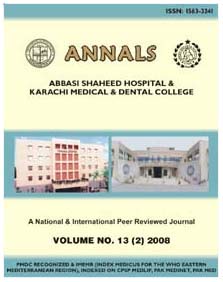
| |
| Home |
| Editorial Staff |
| Instruction to Authors |
| Journal-Issues |
| Policy |
| Copyright |
| ASSESSMENT OF PATIENTS WITH HYPERTENSIVE INTRACEREBRAL HEMORRHAGE AT A TERTIARY CARE HOSPITAL, PAKISTAN
ANJUM Q, RAZA RIZVI, HEMNA SIDDIQUI, MUSTAFA SHOAIB, IRAM KHURSHEED ABSTRACT Objective: The assessment of outcome in admitted patients with hypertensive intracerebral hemorrhage in a tertiary care hospital on the basis of GCS and CT scan. Methods: The cases of hypertensive intracerebral hemorrhage admitted to neurosurgery department of a tertiary care hospital during the year 2004 were included in the study. Those with cerebral infarction, recurrent hematoma, or hemorrhage due to non-hypertensive causes were excluded. The parameters assessed included age and sex of the patient, associated comorbids like DM and IHD, GCS on admission, CT scan findings, management and outcome. Results: A total of 84 cases with hypertensive bleed were analyzed, of which 52 (62%) were between 30-60 years and 32 (38%) were more than 60 years of age with equal sex distribution. Statistically significant association was observed between co-morbidity and outcome of patients (p0.00 1), between CT scan findings and management (p0.006), between management and outcome (p=0.02). Conclusion: Management and outcome of hypertensive ICH is dependent on multiple factors like age of the patient, co-morbidity, CT scan findings and GCS. These are some of the direct predictors of assessing ICH. The aim should be to prevent such incidents secondary to hypertension.
|
For Full text contact to: |
